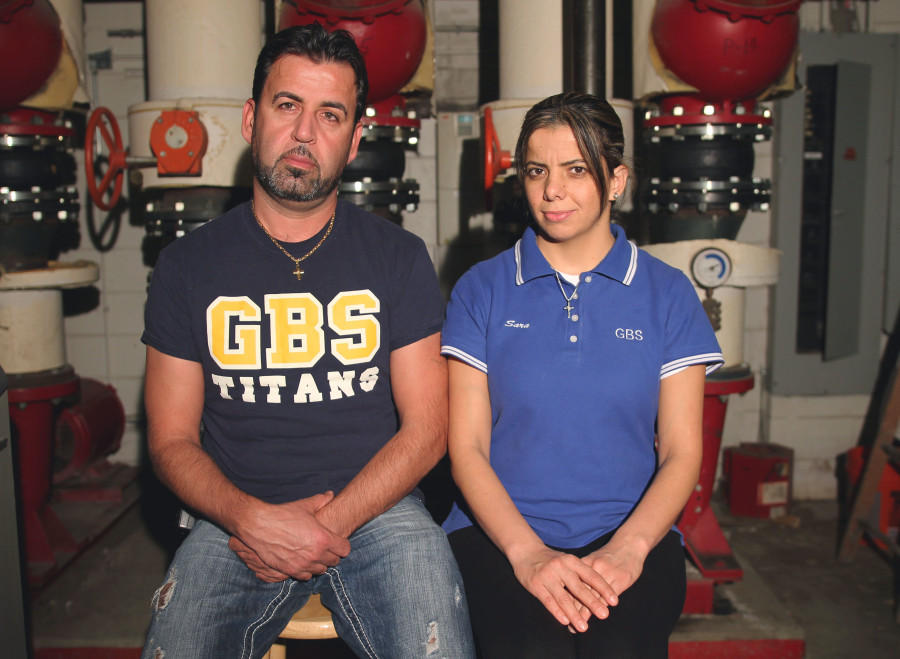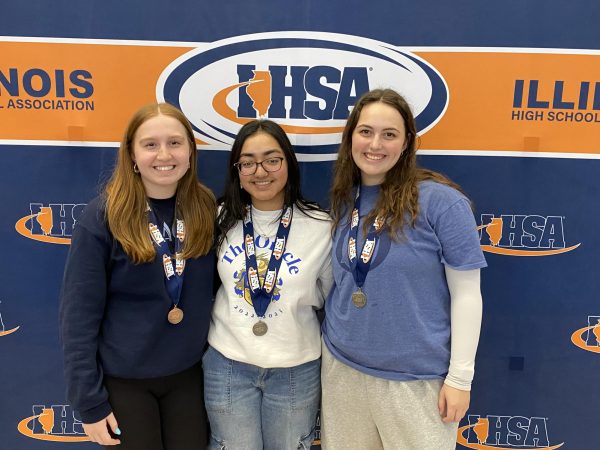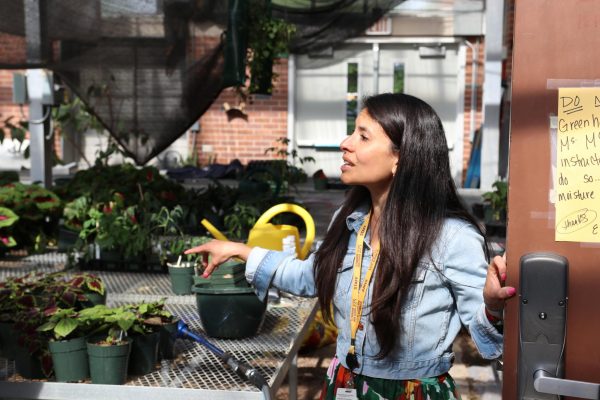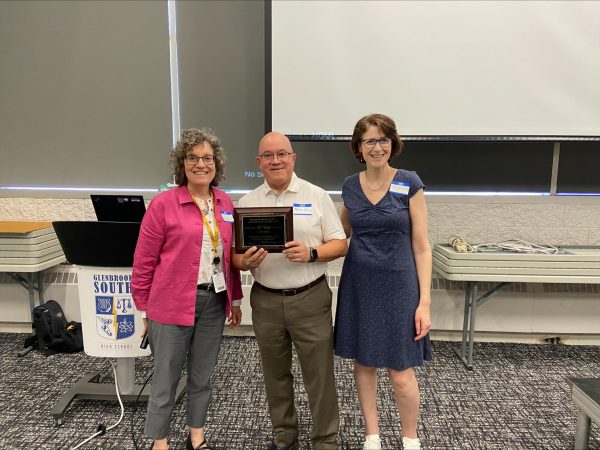Syria faces uncertain future: GBS Assyrians contemplate ongoing conflict in region, urge renewed outlook on controversy
CONTEMPLATING THE CONFLICT: Despite living miles away from the heart of the Syrian conflict, GBS custodians Sahar Barkho and her husband Stewart Adam are affected just the same by the issue through familial connection in the country. The Assyrian population (symbol below) represents the minority of Christians in northern Syria, Iraq, Turkey and western Iran.
November 6, 2015
Refugee camps, forced migrations and displaced persons have transformed the international conversation, creating a heated discussion on the next step towards ending the Syrian refugee crisis. According to the United Nations (UN), a refugee, asylum seeker, (economic) migrant or internationally displaced person is a citizen who is trapped within their own country due to internal conflict. Although this conflict rages on the other side of the world, the ocean is no barrier for students and staff at GBS who have been affected by the international emergency.
According to syrianrefugees.eu, the Syrian refugee crisis, beginning in March 2011 due to the nation’s civil war, resulted in an estimated nine million refugees fleeing Syria and seeking asylum in neighboring nations. The immediacy of the crisis has been highlighted by its expansive nature: the Syrian government, members of the Islamic State of Iraq and Syria (ISIS), Middle Eastern and European nations impacted by the influx of refugees through their borders. According to STAND adviser Matthew Whipple, the complexity of this situation has worsened.
“Even if the conflict were to end tomorrow, the Syrian civil society has collapsed, and these people that are in Europe and in Lebanon and Turkey and all of these places where Syrians have found themselves, are not just going to get up the next morning and go home,” Whipple said. “These people are going to need help, need assistance and support, for some time.”
With members of ISIS targeting Assyrian Christians, refugees like sophomore Rachel Nwia’s family are attempting to escape the perilous environment.
“[My family is leaving Syria] mostly because they don’t feel safe there,” Nwia said. “They don’t want to lose their lives due to something that they don’t want to get involved in, but they’re being forced to get involved in. [For example], my dad’s old village, Aleppo, […] [has] been bombed several […] times, and [the villagers are] not fighting. They aren’t taking sides or anything. They’re just trying to live their lives, but due to […] their lives being at stake, they had to leave their towns.”
Due to the war’s destruction, Nwia and her family struggle to ensure consistent communication with their relatives in Syria. According to Nwia, there have been many times when her family has been unable to speak with their relatives for long periods of time.
“My dad will try to call his family, but sometimes we won’t be able to reach them due to communication being down due to something […] getting bombed,” Nwia said. “Or […] [once my cousin] was trying to leave […] to visit his family […] in Detroit […] but rebels had taken over a road to the airport so he couldn’t leave for a couple of months. So the communication between him and his family kind of got interrupted as well as communication with my father and his family.”
In addition to Nwia’s personal connection to the Syrian refugee crisis, GBS custodian Sahar Barkho is a Syrian native and currently has family living in the country. According to Barkho, she and her husband, Stewart Adam, have adopted financial responsibility to help their family with inflation and unemployment.
“I have a family that […] went as refugees [into] Lebanon,” Barkho said. “They couldn’t afford living in Lebanon. […] The government cannot support them as a refugee [to] give them food or pay them […] monthly for the rent […]. They have to [pay for those things] themselves or we have to help them. But [even though] [my husband and I] work […] we couldn’t support [all of our] family in Syria and in Lebanon, so [the refugees in Lebanon] have to go back again to Syria.”
Besides communication and financial difficulties, Nwia’s family has been impacted by war casualties. According to Nwia, her cousin was one of ISIS’s victims after being targeted for being a Christian.
“A couple weeks ago actually […] my dad’s third cousin […] was kidnapped and executed by [ISIS],” Nwia said. “My family found out from a video that ISIS posted of his execution. That’s how his family found out that he died, and […] that really hit me […] because we aren’t involved in it, but we are suffering the consequences of other people’s actions.”
Barkho’s life has also been tinged with grief after losing numerous family members and friends to the violence. Her 19-year-old nephew, George Adam, was killed by a Kurdish sniper while serving in the Syrian army—not by an ISIS weapon. According to Barkho, she will never forget the moment when, at her home, she got the call that her nephew had passed.
“We [got] a phone call from Lebanon [where] they told me [that my husband] lost his first nephew—that he got killed in the war,” Barkho said. “When they told me, […] I couldn’t breathe. I had like [a] panic attack, and I [started] screaming. I was like, ‘No way, no way this has happened.’ […] My kids, they were sleeping when I screamed. They came to me, and they [hugged] me. ‘Mom, what happened? What happened, please?’ And they were crying. […] I fell down on the floor, and I am crying with my loud voice, [wondering] why this had happened, why this is going on. And no one can hear us; no one can feel us.”
Recognizing the danger of traveling in Syria, Nwia knows she will never be able to visit the land of her ancestors. According to Nwia, she specifically witnessed the danger occurring in her family’s homeland when watching the news one night with her dad, where the violence became more personal.
“[The news was] talking about the bombing of Aleppo, and my dad lived there,” Nwia said. “He grew up there […], and I remember sitting there next to my dad; […] he was just speechless, because this entire town was rubble, and I just started bawling. I couldn’t stop crying, and my dad was like, ‘It’s going to be okay.’”
According to Barkho, she would rather be killed in Syria than attempt escape, despite all the violence and fear associated with the Syrian refugee crisis. She would prefer to sacrifice her life rather than sacrifice her values.
“Even if I was [in Syria] today with what’s going on with […] ISIS, I would never deny my religion or [that] I am Christian,” Barkho said. “I would rather die, and I would rather be beheaded or killed [than] deny my religion. I would die with [the] proud Jesus [and] with [the] proud cross, […] because I would never give up. […] As a human, they can kill my body, but they can not kill my soul.”
Understanding the sacrifices made daily by Syrian refugees, Nwia sides with peace and stability in Syria. In order to achieve this security, Nwia believes education on the topic is the first step towards progress in aiding the refugees. According to Nwia, action can only be taken once everyone, including all GBS students, understands what the crisis is and why the violence is so detrimental to Syrian citizens and their families.
“I think [GBS students] need to learn about what’s happening because a lot of people […] talk about it, but they’re not really educated about the situation that’s happening right now,” Nwia said. “So, if I [ask] [them for] anything, it’s just to learn more about what’s happening because I think that could do so much […] [on] how we talk about it, and maybe even bring us to find more solutions.”
In agreement with Nwia, Whipple also believes that education is necessary to generate change. With this in mind, STAND for Peace (STAND) held a “STAND for Syria” week-long campaign and fundraiser last year for the UN High Commission on Refugees, raising a total of $1,500. For the coming year, STAND hopes to continue their awareness and fundraising efforts in order to further aid the growing number of Syrian refugees.
“We don’t want these people starving to death, losing their lives trying to find a safer place; that’s not who we are [and] that’s not what we want in the world,” Whipple said.
Similar to Whipple, Barkho said one of the most effective ways to aid Syrian refugees is to rethink the crisis from a new perspective. According to Barkho, she wants all GBS students to remember to be thankful for the freedoms and safety the United States promises. Barkho specifically sees the value of her current situation in the way that she goes to bed at night and feels safe, which is extremely different than what her family and friends are facing in Syria.
“[I don’t want] people here in the United States […] to take this country for granted,” Barkho said. “It’s the best country. […] American people are with the best kinds of hearts. […] I am very happy that I am living here. I love [the] United States [because of] freedom of religion [and] freedom of how you want to live. [Freedom] is the best thing. It makes me live peacefully [and happily]. […] And I hope one day, the war will stop in my country.”









